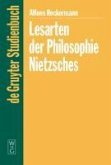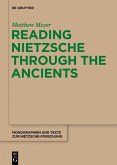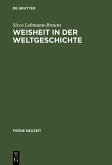Campioni investigates Nietzsche's multifaceted occupation with the French culture of his time, drawing especially upon the philosophical and psychological writings of authors like Bourget, Renan, Féré, Ribot, and Taine. With Stendhal, Nietzsche turns to the analytical French spirit ? against the excesses of Wagnerianism and German national self-understanding.
Dieser Download kann aus rechtlichen Gründen nur mit Rechnungsadresse in A, B, BG, CY, CZ, D, DK, EW, E, FIN, F, GR, HR, H, IRL, I, LT, L, LR, M, NL, PL, P, R, S, SLO, SK ausgeliefert werden.
"Für alle, die tiefer in den intellektuellen Mikrokosmos von Nietzsche eintauchen möchten, ist der Band zu empfehlen."
Nico Koppo in: Kritikon 23.03.2010
"Für den fortgeschrittenen Nietzsche-Leser, der mit den Nachlass-Fragmenten einigermaßen vertraut ist, wird Campionis Aufsatzsammlung inspirierend sein."
Alexander Nebrig in: Germanisch-Romanische Monatsschrift 4/2009
"Campioni betreibt nicht nur hervorragende Quellenforschung, sondern schreckt auch nicht davor zurück, unser Nietzsche-Bild bis hin zu den Konzepten des Willens zur Macht, des Todes Gottes und eines nicht-einheitlichen Subjektes zu revidieren."
Roland Duhamel in: Germanistik 3-4/2009
Nico Koppo in: Kritikon 23.03.2010
"Für den fortgeschrittenen Nietzsche-Leser, der mit den Nachlass-Fragmenten einigermaßen vertraut ist, wird Campionis Aufsatzsammlung inspirierend sein."
Alexander Nebrig in: Germanisch-Romanische Monatsschrift 4/2009
"Campioni betreibt nicht nur hervorragende Quellenforschung, sondern schreckt auch nicht davor zurück, unser Nietzsche-Bild bis hin zu den Konzepten des Willens zur Macht, des Todes Gottes und eines nicht-einheitlichen Subjektes zu revidieren."
Roland Duhamel in: Germanistik 3-4/2009









